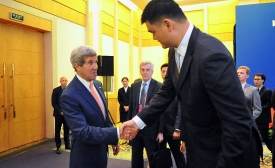vietnam
Vietnam and South Korea have long shared a historical and cultural background in sinocentric Confucianism and have encountered few cultural obstacles. It is not surprising, then, that the ‘Korean wave’ — or Hallyu — in Southeast Asia is said to have started in Ho Chi Minh City, where the first Korean drama series ‘Medical Brothers’ was shown in 1998.
After capturing the hearts of Vietnamese audiences, South Korea continued to conquer the broader Vietnamese market. As of December 2014, South Korea has been Vietnam’s biggest investor, with US$37.23 billion of foreign direct investment in 4,110 projects throughout the country.
Foreign Ministry's Spokesperson Pham Thu Hang on January 8 announced remarks in external activities in 2014 and diplomatic orientations for 2015. Viet Nam also closely coordinated the Party and State’s diplomacy and people-to-people exchange with national defense and security.
China's top political advisor Yu Zhengsheng wrapped up his visit to Vietnam here on Saturday, during which he agreed with the Vietnamese leaders to enhance mutual trust and properly settle maritime disputes through negotiations.
Reassurance is needed. Hopes that China’s spectacular climb to superpower status might be completed without conflict have been dented in recent years. Its assertive approach to old but until recently largely quiescent territorial disputes with Japan, the Philippines, Vietnam and India has jangled nerves.
Vietnamese police have detained a blogger for posting "bad content" about the state, the latest move in a crackdown on dissent that has been condemned by rights groups and Western governments.
Since the election of Narendra Modi as India’s Prime Minister, New Delhi has appeared determined to create “Brand India” by harnessing its soft power resources. This was very much on display at the meeting Modi had with his Vietnamese counterpart Nguyen Tan Dung, during the latter’s visit to New Delhi late last month.

U.S. public diplomacy tends to react to situations, rather than taking initiative, says Philip Seib.







